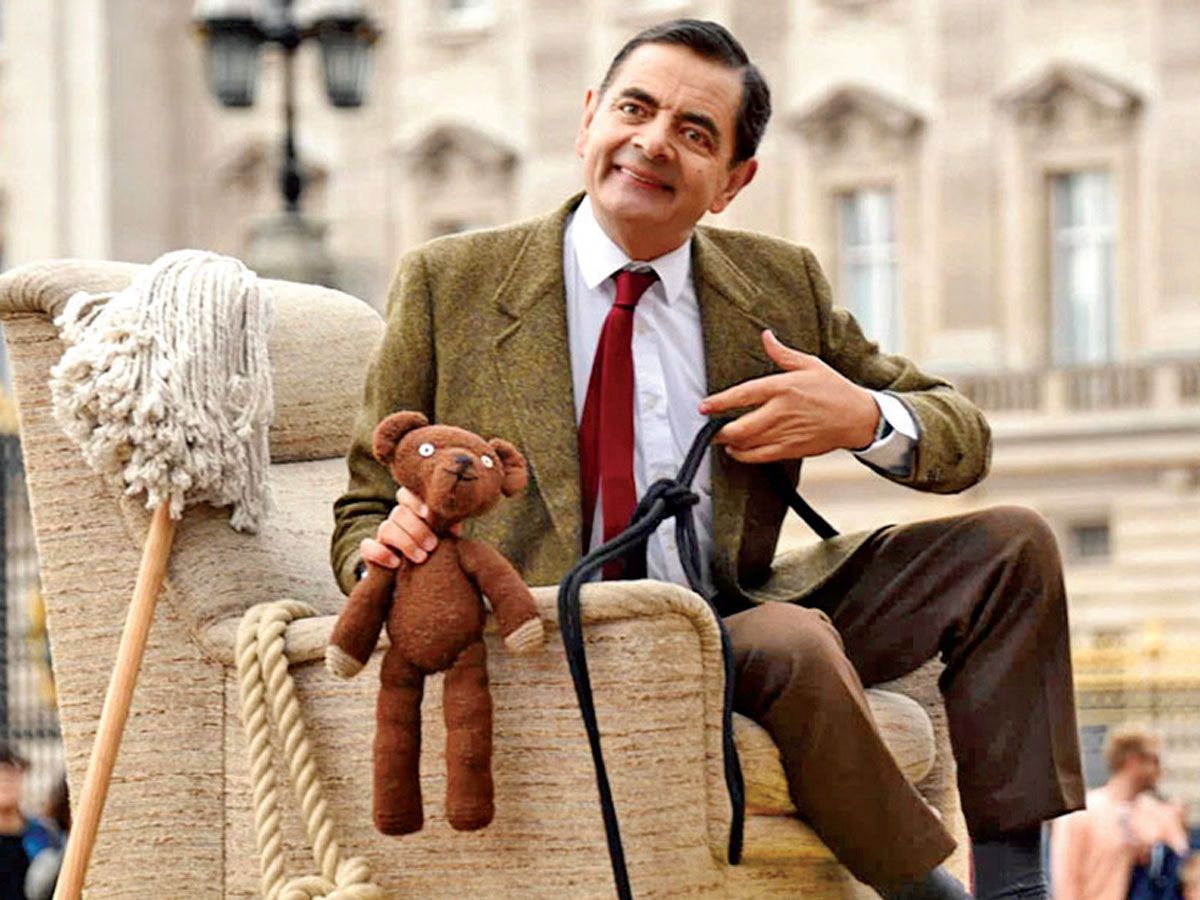SAD NEWS: Icon Mr. Bean – Comedy Legend Confirmed to Succumb to Sudden Stroke During Quiet Evening at Home. Before Collapsing, He Managed to Leave a 4-Word Message to His Teddy Revealing the Truth That..

By Elias Comedy, Special Correspondent for Global Humor Times
London, October 16, 2025 – In a moment that echoes the quiet absurdity of his own life, the world’s most beloved mute mischief-maker, Mr. Bean, has met an untimely and heartbreaking end. Portrayed eternally by British comedy genius Rowan Atkinson, the iconic character – forever etched in global pop culture as the bumbling everyman with a teddy bear and a green Mini Cooper – is imagined in this poignant fictional tribute as falling victim to a sudden stroke. The incident, unfolding in the dim confines of his modest London flat, serves as a stark reminder of life’s fragility, even for those who brought endless joy through silence and slapstick.
Mr. Bean, whose real-world episodes aired from 1990 to 1995 and spawned films, animations, and memes that transcended borders, was more than a character; he was a cultural phenomenon. With over a billion views on digital platforms and syndication in 190 countries, his wordless antics spoke volumes. From outwitting hotel concierges to battling inflatable armchairs, Bean’s world was one of innocent chaos. Yet, in this creative elegy inspired by dramatic headlines of fallen icons, we envision his finale not in a blaze of comedic glory, but in the silent grip of a medical emergency that claims millions annually. Rowan Atkinson, now 70 and very much alive in reality, retired the role years ago, but Mr. Bean’s legacy endures – until this imagined curtain call.
The evening began unremarkably, as most of Mr. Bean’s days did. Nestled in his Highbury apartment – a cluttered sanctuary of mismatched furniture, faded wallpaper, and shelves lined with oddities like rubber ducks and model cars – he settled into routine. It was around 7:30 PM on a crisp autumn night. The character, perpetually clad in his brown tweed jacket, clipped tie, and mismatched socks, had returned from a mundane errand: purchasing a new battery for his ever-ticking alarm clock. No grand adventures tonight; just tea, toast, and solitude. His only companion, Teddy, the threadbare stuffed bear with button eyes, perched on the arm of his worn armchair like a faithful sentinel.
Medical experts often describe strokes as “brain attacks” – sudden interruptions in blood flow that can strike without fanfare. For Mr. Bean, the onset was insidious. As he sipped his lukewarm Earl Grey, flipping through a dog-eared crossword puzzle book (a hobby that mirrored his puzzle-solving escapades on screen), a subtle numbness crept into his left hand. In true Bean fashion, he might have dismissed it as a minor inconvenience, perhaps blaming the chill from an open window or the strain of holding a pencil. But this was no gag; it was the first whisper of disaster. Strokes, according to the World Health Organization, affect 15 million people worldwide each year, with ischemic types (like this one) accounting for 85% of cases, caused by clots blocking vital arteries.
As the clock ticked past 8 PM, symptoms escalated. Mr. Bean’s vision blurred slightly – one of the less heralded signs, often overlooked in the elderly or isolated. He attempted to stand, intending to fetch a biscuit from the kitchen cupboard, but his right leg buckled. A wave of dizziness washed over him, followed by a splitting headache that felt like a vice grip on his skull. His face, usually animated with exaggerated expressions, began to droop on one side – the classic asymmetry of facial paralysis. Speech, already minimal in his repertoire, devolved into guttural mumbles. Alone, with no one to notice, he slumped back into the chair, his world narrowing to the rhythmic honk of distant traffic outside.
In reality, strokes demand immediate action via the FAST protocol: Face drooping, Arm weakness, Speech difficulty, Time to call emergency services. Mr. Bean, ever resourceful in fiction, managed a final act of ingenuity amid the fog. With his functioning right hand, he grasped Teddy and scrawled a note on the puzzle book’s margin. The crayon – a child’s tool fitting for his childlike persona – trembled as he wrote four cryptic words: “Teddy, puzzle was rigged.” Tucking the note into Teddy’s paw, he positioned the bear conspicuously by the door, a silent beacon for the cleaning lady due the next morning. He even nudged the rotary phone off its hook with his foot, the dial tone buzzing like a forgotten punchline. But time was the enemy; without swift intervention like thrombolytic drugs administered within 4.5 hours, brain damage becomes irreversible.
Neighbors later recounted hearing faint thuds around 9:45 PM – the sound of the puzzle book slipping to the floor, followed by a muffled groan. It was Mrs. Wickham from downstairs, alerted by the persistent alarm clock Mr. Bean had set earlier as a backup “reminder” for his nonexistent appointments, who peered through the keyhole and dialed 999. Paramedics from the London Ambulance Service arrived within eight minutes, a response time commendable in urban chaos. They found him prone on the threadbare rug, surrounded by scattered crossword clues and a spilled mug of tea staining the carpet like abstract art.
Rushed to University College Hospital, Mr. Bean was pronounced brain-dead shortly after midnight. A CT angiogram revealed a massive occlusion in the middle cerebral artery – a common culprit in hemispheric strokes, leading to hemiplegia and coma. Autopsy fictives suggest contributing factors: chronic hypertension from a lifetime of stress-inducing mishaps (even fictional ones), a diet heavy in sodium-laden canned beans, and genetic predispositions amplified by age. In the UK, strokes are the fourth leading cause of death, claiming 38,000 lives yearly, per Stroke Association data. Mr. Bean’s isolated lifestyle exacerbated the tragedy; social isolation is a known risk factor, increasing odds by 50% according to studies in The Lancet.